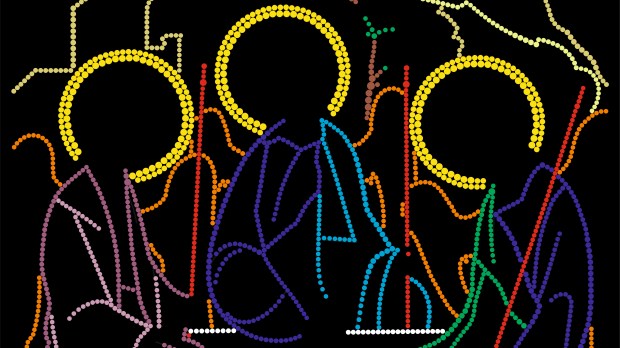Why is it that where two or three are gathered together Jesus promises to be there in the midst of them (this Sunday’s Gospel)? For at least two reasons: to reveal something crucial about God himself; and to respond to an urgent need we all have as human beings.
About God and us
The Catechism reminds us of something we must never forget: “God is one but not solitary” (254). To meet God is to encounter communion. Jesus being there in the midst of two or three gathered in his name gives a glimpse of the unity of Persons he lives with the Father and the Holy Spirit. To believe in Jesus Christ — to love him — is to be called into that union.
In fact, we can’t truly be ourselves unless we are part of such a communion. Pope Benedict XVI often stressed that “human beings are relational, and they possess their lives — themselves — only by way of relationship.” He wrote:
“I am truly myself only when I form relationships. The human being is created with a need for others so that he may pass beyond his own limits.”
The need to gather
This is demonstrated poignantly in a scene from the 2010 movie The Way. The story revolves around a man whose son has been killed in a tragic accident while walking the famous El Camino de Santiago — an ancient pilgrimage route leading to the Cathedral of Santiago de Compostela in Galicia, Spain. The father decides that he himself will hike the 500 miles as an homage to the memory of his son. He is joined along the way by a motley group of fellow pilgrims: a man oppressed with overeating and body image issues; a woman ravaged by abuse and addiction; a writer deadlocked by writer’s block. The four could not be more unalike. So when they reach the city of León, Spain, with its fancy five-star Parador de León Hotel, and the father offers to treat them to an overnight stay, you would expect them to leap at the opportunity for a little privacy and pampering. In fact, they do indulge in champagne, a manicure, gourmet delicacies, luxury accommodations, and elite amenities.
And yet, something strange happens. That evening, just as the father settles in for some quality alone time in his suite, there comes a knock at his door. It is the woman … who invites herself in. As the door closes, there’s another knock: the oppressed man. And then after him the writer, who joins the group. But the four have been with each other day in and day out for weeks! Why wouldn’t they take advantage of this rare chance to be on their own for a while, luxuriating in the pleasures of the exclusive place?
The reason is because out there, on the way, a bond began to form, fusing them … so much so that, despite all the deluxe comforts at their beck and call, they couldn’t bear even that evening to be apart from each other. That is, they couldn’t bear being solitary; they wanted to be like God. They wanted to be together. They wanted to continue living the presence that had come among them and that had united them as they walked together as pilgrims on the way. They have passed beyond their own limits.
The beauty of belonging
Jesus chooses to be in our midst when we gather as two or three in order to impress upon us the beauty of belonging.
Belonging, says Servant of God Luigi Giussani, is “the ultimate criterion for facing all reality.”
We are made by a belonging — belonging is more original to us than our solitude. If there weren’t the awareness of a belonging, then the human being would be faced with his own nothingness. To be myself I need someone else. Alone, we cannot be ourselves. Christ is realized in us and among us through our companionship. That for which the ‘I’ is made and for which it does everything is a Presence.
This Presence appears in the belonging we share. The painter Vincent Van Gogh was deeply aware of the need for belonging, and expressed it in a letter to his brother Theo (July 1880):
You cannot always tell what keeps you confined, what seems to bury you. Do you know what makes the prison disappear? Every deep, genuine affection. Being friends, being brothers, loving, that is what opens the prison, with supreme power, by some magic force. Without these one stays dead.
As the late Msgr. Lorenzo Albacete well reminds us:
We do not come together as Church in order to find intellectual answers to our questions about the meaning and purpose of life. This is to reduce the Church to an ideology. We come together not to find answers but to learn how to recognize and affirm a Presence.
~
Find Fr. Peter John Cameron’s reflection on the Sunday Gospel each week here.
And follow his series of brief reflections on prayer here.


